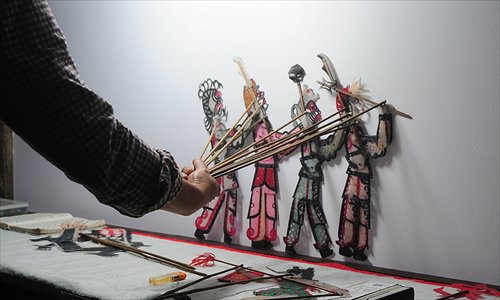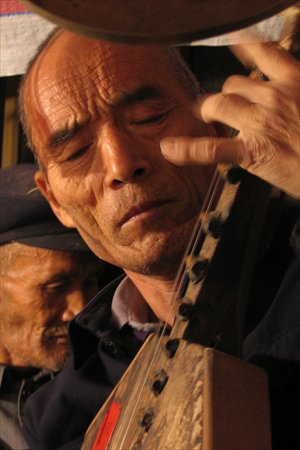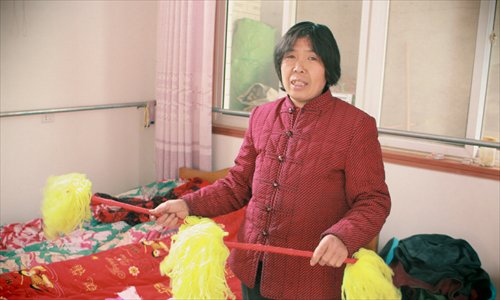Life heritage
By The Beijing News – Global Times Source:The Beijing News – Global Times Published: 2014-4-9 21:08:01

A performer gives a traditional shadow play. Photo: IC

Lü Chongde Photo: Courtesy of Tsinghua University Press

Chi Suying Photo: Courtesy of Tsinghua University Press
During the day a factory worker spends his days at a chemical fertilizer plant, while at night he lives the life of a traditional Chinese literati playing the xiao flute and cultivating a bonsai tree. This artistic lifestyle, seemingly only enjoyed by fictional recluses in stories, is an actual reflection of the modern inheritors of China's intangible cultural heritage as illustrated in the book Four Chinese.A unique lifestyle
Four Chinese covers the lives of four ordinary people who are both farmers/blue-collar workers and inheritors of an intangible cultural heritage. The fruit of seven years of field research by several scholars and students from the School of Journalism and Communication at Tsinghua University, the book has attracted quite a bit of attention recently.
The crew's original intention was to shoot a documentary about China's intangible cultural heritage that only focused on the traditional arts themselves. However, as they investigated further, they found that the inheritors of these arts, mainly poor farmers and workers at the bottom of society, were just as worthy of being documented due to their charming personalities and unique lifestyles. In the end they chose to write a book about four of these inheritors in parallel with their documentary.
One of the four, Cheng Xiaochun, works in a chemical fertilizer plant in Quzhou, Zhejiang Province. During his off hours at home he makes zhilian, a tool for making traditional hand-made paper that has become nearly extinct due to the rise of mass produced paper. For Lei Jianjun, an associate professor with Tsinghua University and the team's lead researcher, what touched him the most was how Cheng balances his dual lifestyles.
As a cultural inheritor of this art, Cheng lives the life of a traditional intellectual. In addition to being good at chess, music, calligraphy and painting, he also takes the time to cultivate bonsai trees. From time to time, he also goes digging for medicinal plants. "He knows a lot about herbs, and is clear about which wild herbs can be used in traditional Chinese medicine," said Lei.
Such rich life experience is reflected in the other three as well. Lü Chongde, for instance, carries on the traditional shadow play art of Huaxian county, Shaanxi Province. A traditional performance art in which cut-out figures are used to project shadows on a backlit screen to tell a story, Lü first learned this art to put food on his table while he was young. Now that he's older he has continued to enjoy shadow play as a hobby. Like Cheng, he is a shovel-holding farmer during the day and a yueqin, or moon guitar, playing artist at night.
Gao Xiye, a farmer from Yulin, Shaanxi Province, sings improvised songs at weddings and funerals as a way to increase his income. He regards himself as an artist and hopes to find more apprentices to carry on this traditional art.
Meanwhile, the only female figure covered in the book, Chi Suying from Zanhuang, Hebei Province has a great passion for China's traditional fan-drum dance, which she dances whenever she has time for the sheer enjoyment it brings.
These carriers of tradition have made China's cultural heritage so much a part of their daily lives that it is difficult to separate the two. For them, carrying on old traditions is simply a matter of living their lives as they are.
Cultural protection
While these four have made China's traditional arts a part of their lives, it is difficult for the next generation to do the same.
"The social environment has changed, which means it may be impossible to see these types of intangible cultural arts in all their glory again," said Jiao Ruiqing, one member of the research team.
While Jiao is also from Zanhuang, she knew little about the region's fan-drum dance until the team began the documentary. When she was little, her parents always encouraged her to study hard so she could "live a decent life in the city." This meant she had little chance of coming into contact with the intangible cultural heritage of her hometown.
Lei noted it is no longer possible for young people to live a life as varied as their predecessors, due to the irreversible impact of the business era and information society we live in.
He sees this as a problem mainly dealing with today's family education, which is dominated by utilitarianism. "Parents won't let their children learn things that seem useless. If they continue to treat children this way, it will be impossible for them to live a happy and colorful life," Lei said, noting that the four inheritors mentioned in the book developed their skills because of family education.
Meanwhile, changes in society have impacted the traditional way in which these arts are inherited, resulting in a dilemma when it comes to protecting China's intangible cultural heritage. For example, the cultural company where Lü worked employs almost all the shadow play artists in Huaxian county and therefore has a monopoly on the performance of shadow play in the local area.
"They only play in cities and so the art is cut from the soil of rural areas. As time passes, farmers will forget this art and it will gradually vanish," Lei commented.
One of the reasons Lei decided to film the documentary and write this book was to help fight against the decay of rural lifestyles and the traditions that go with it. He hopes a way can be found to protect the nation's intangible cultural heritage without damaging it.
As Jiao sees it, every form of intangible cultural heritage changes with time, and if integrated well with the outside world will be able to continue to survive. "They just need more opportunities and platforms to carry on these arts," she said.
Posted in: ARTS